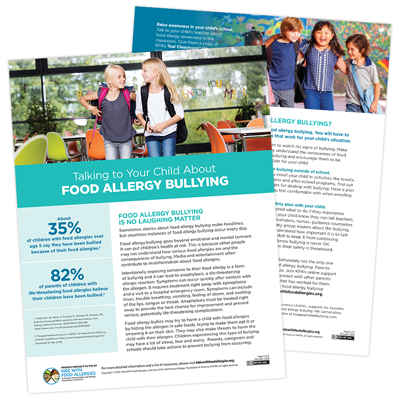Food Allergy Bullying Is No Laughing Matter
In Pittsburgh, a high schooler had to be treated for anaphylaxis after three classmates brought in pineapple, to which she is highly allergic. One of the classmates rubbed the pineapple on her hands and gave the girl a high five.
In another story, a 13-year-old boy with a milk allergy died from anaphylaxis after one of his classmates flicked cheese into his mouth.
These stories may have made headlines, but countless instances of food allergy bullying occur every day. About 35 percent of children with food allergies over age 5 say they have been bullied because of their food allergies.1 And 82 percent of parents of children with life-threatening food allergies believe their children have been bullied.2
Food allergy bullying goes beyond emotional and mental torment. It can put children's health at risk. This is because other people may not understand how serious food allergies are and the consequences of bullying. Media and entertainment often contribute to misinformation about food allergies.
Intentionally exposing someone to their food allergy is a form of bullying and it can lead to anaphylaxis, a life-threatening allergic reaction. Symptoms can occur quickly after contact with the allergen. It requires treatment right away with epinephrine and a visit to a hospital emergency room. Symptoms can include hives, trouble breathing, vomiting, feeling of doom, and swelling of the lips, tongue or throat. Anaphylaxis must be treated right away to provide the best chance for improvement and prevent serious, potentially life-threatening complications.
Food allergy bullies may try to harm a child with food allergies by hiding the allergen in safe foods, trying to make them eat it or smearing it on their skin. They may also make threats to harm the child with their allergen. Children experiencing this type of bullying may have a lot of stress, fear and worry. Parents, caregivers and schools should take actions to prevent bullying from occurring.
Kids With Food Allergies (KFA), a division of the Asthma and Allergy Foundation of America (AAFA), supports No Appetite for Bullying, a collaboration with other advocacy groups to raise awareness about food allergy bullying. We cannot allow food allergy bullying to continue, and we must all work together to stop it. Learn more at noappetiteforbullying.com.
What Can I Do to Address Food Allergy Bullying?
There is more than one way to prevent or respond to food allergy bullying. You will have to work with your child and your child's school to find ways that work for your child’s situation.
Talk with your child about bullying. Teach your child what bullying looks like. Let them know this is not acceptable and they don't have to tolerate it. Help them identify adults who can intervene to prevent further bullying. Try role playing to practice how to speak up to an adult.
Watch your child for signs of bullying. Your child may be afraid to tell you they are being bullied. Some signs to watch for:
- Reluctance to go to school or other activities
- Makes excuses to not go to school or activities, like complaining often of headaches or belly aches
- Doesn't want to ride the bus
- Depression, withdrawal and changes in eating and sleeping habits
- Unexpected drop in grades
- Unexplained injuries
- Lost or broken belongings
If you notice these signs, talk with your child right away to find out what's going on.
Form allies. Get to know your child's teachers, bus driver and the adults in charge of other activities. Ask them to watch for signs of bullying. Make sure they understand the seriousness of food allergy bullying and encourage them to be an advocate for your child.
Raise awareness in your child's school. Talk to your child's teacher about food allergy awareness in the classroom. Give them a copy of KFA’s Teal Classroom™ Kit which includes food allergy awareness lesson plans, encourages food-free celebrations and promotes inclusion. Food allergy awareness can help children understand your child's food allergy better.
Watch for bullying outside of school. When you enroll your child in activities like scouts, dance, sports and after-school programs, find out their policies for dealing with bullying. Have a plan in place you feel comfortable with when enrolling your child.
Create a safety plan with your child. Teach your child what to do if they experience bullying. Let your child know they can tell teachers, school administrators, nurses, guidance counselors and community group leaders about the bullying. Help them understand how important it is to talk to a trusted adult to keep it from continuing. They need to know bullying is never OK, especially when their safety is threatened.
Get support. Your child is unfortunately not the only one affected by food allergy bullying. Parents need support, too. Join KFA’s online support community to connect with other parents who can share what has worked for them when addressing food allergy bullying : community.kidswithfoodallergies.org.
Share your story. Help us raise awareness about food allergy bullying by telling your child's story. By spreading awareness, you can make a difference for children with food allergies affected by bullying.
 Download this guide as a free PDF
Download this guide as a free PDF
References
1. Lieberman JA, Weiss C, Furlong TJ, Sicherer M, Sicherer, SH. Bullying among pediatric patients with food allergy. Ann Allergy Asthma Immunol. 2010:105(4): 282-286. https://www.ncbi.nlm.nih.gov/pubmed/20934627
2. Noappetiteforbullying.com. (2018). No Appetite For Bulying. [online] Available at: https://www.noappetiteforbullying.com/ [Accessed 12 Feb. 2018].
JOIN NOW
Updated November 2018


Comments (0)